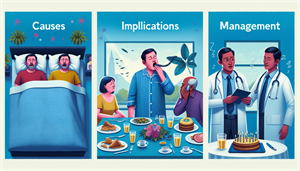
Can Chronic Pain Cause Sleep Apnea?
Chronic pain and sleep apnea - two conditions that are challenging enough on their own. But what happens when they coexist? For many individuals, this is not a hypothetical question but a daily reality.
The intricate relationship between chronic pain and sleep apnea is much more than just the mere coexistence of two conditions - it’s a complex interplay that can significantly impact the quality of life.
As we delve into this topic, we’ll explore the ways these conditions interact, the challenges they present, and the potential strategies to manage them better, including the question: can chronic pain cause sleep apnea?
Key Takeaways
-
Chronic pain and sleep apnea have a bidirectional relationship, where each condition can exacerbate the other, suggesting the importance of early screening and dual-focus treatment strategies for patients experiencing both.
-
The prevalence of chronic pain is higher among patients with obstructive sleep apnea compared to the general population, and a range of chronic pain conditions, including fibromyalgia and arthritis, are closely associated with sleep apnea, highlighting the need for comprehensive and integrated management approaches.
-
Treatment strategies, including CPAP therapy, pain management techniques, and lifestyle modifications, can significantly improve the quality of life for individuals suffering from both chronic pain and sleep apnea and require careful consideration and customization from healthcare providers.
Understanding the Relationship Between Chronic Pain and Sleep Apnea
Decoding the link between chronic pain and sleep apnea is complex. To fully comprehend this intricate connection, one must first acknowledge the high prevalence of sleep disorders, particularly sleep apnea, among patients with chronic pain.
Indeed, the prevalence of chronic pain among patients diagnosed with obstructive sleep apnea syndrome ranges between 51-76%. This is notably higher in comparison to the general population, where it ranges between 15-29%.
A closer look at this relationship reveals the impact of sleep disturbances on chronic pain.
Sleep fragmentation and mood disorders play a significant role in exacerbating chronic pain in patients with obstructive sleep apnea. This highlights the intricate connection between sleep disturbances and chronic pain. However, the relationship isn’t one-sided. Chronic pain can also contribute to the development of sleep disorders, signaling a bidirectional relationship between these conditions.
Comprehending this association is pivotal for the efficient management of these conditions. Early screening and treatment of obstructive sleep apnea can enhance pain symptoms in patients with chronic pain. Thus, targeted treatments considering both conditions could potentially enhance the quality of life for patients suffering from chronic pain and sleep apnea.
The Bidirectional Nature of Pain and Sleep Disorders
The reciprocal interplay of pain and sleep disorders illustrates how chronic widespread musculoskeletal pain can lead to sleep disorders and how the latter can exacerbate pain. This cycle of exacerbating symptoms can present a significant challenge for individuals dealing with both conditions.
Consider the impact of obstructive sleep apnea on pain sensitivity. Individuals diagnosed with OSA demonstrate a reduction in pain threshold and an elevation in pain sensitivity and spontaneous pain compared to individuals without OSA. This highlights the connection between pain and sleep disturbances and how they can influence one another.
Various painful conditions, including headaches, fibromyalgia, and chronic widespread pain, are frequently associated with obstructive sleep apnea. Additionally, restless leg syndrome, often seen in individuals experiencing chronic pain, is frequently linked to a condition known as central sensitization.


